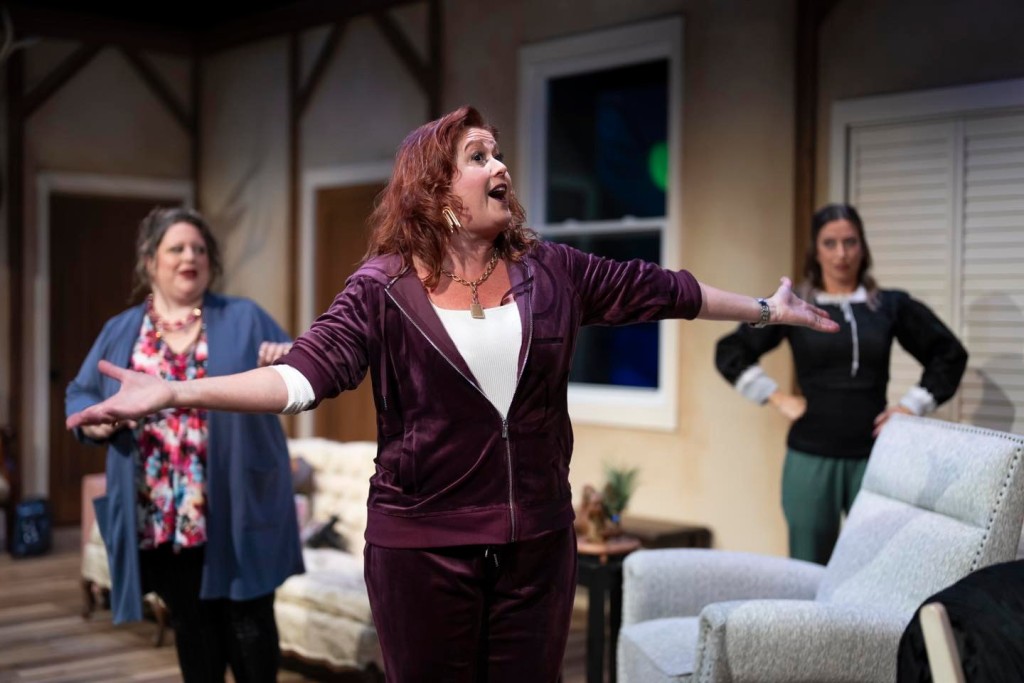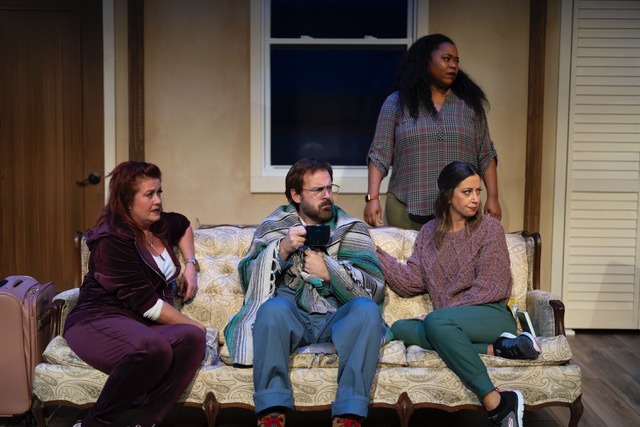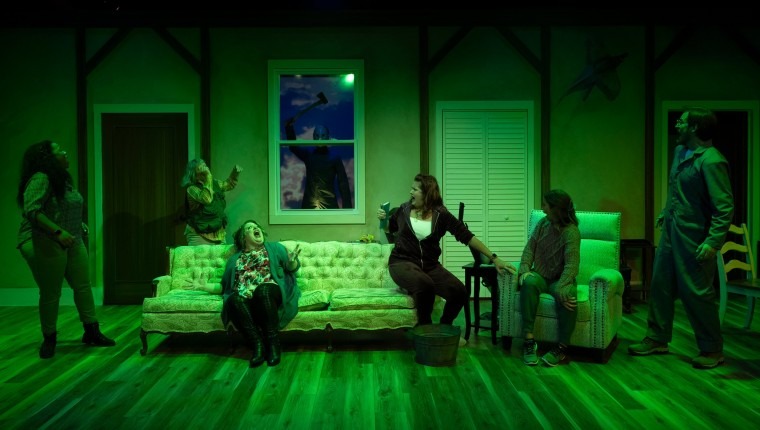Through November 5
freeFall Theatre, St Pete
Details here
A year ago, actor Matthew McGee had an idea for a play. He had been talking with playwright Natalie Symons about how dark and long-winded plays had become and wasn’t it time for more humor onstage?
He challenged Symons to write a comedy based on a rough sketch that he drew up – “After a Hollywood Housewife’s recent scandal ignites a flurry of backlash on social media, she and her entourage flee to the countryside to hide from the haters. But things go horribly, comically wrong.” McGee even gave the play a catchy title – Nightsweat.
Now ideas, as they say, are a dime a dozen, but when one comes from an actor who has been called Tampa Bay’s most famous gender-bending drag performer, a playwright is wise to take notice. Symons took up her friend’s dare and did him one better – she didn’t just write a comedy but an old fashioned door-slamming, keep-em-guessing mystery farce.

The four women fleeing into the countryside from McGee’s original sketch are still there, along with two more cast members added by Symons – Mrs. Bates (played by Jan Neuberger), whom Symons calls her “best invention yet” and Bates’ nephew (played by James Putnam), a taciturn recluse (who may or may not be a serial killer).
Writing the play on a visit with her sister in New England, Symons set Nightsweat in (what may or may not be) McCurdy’s Haunted AirBnB in the Berkshires.
In Symons’ script, the “Hollywood Housewife” of McGee’s original idea has become a has-been actress. Her scandal? Britney Cox (played by Kristin Carbone) was cancelled from an off-Broadway show (way, way off Broadway, in Buffalo, in fact) because she was exposed as falsely posing as a trans lesbian to get into the show. To escape the media fury that ensued, she books a Mystery Weekend at an AirBnB in the Berkshire’s with three women who work for her.
We first see one of those women, Tawny Fitzsimmons (played by Sara DelBeato), awkwardly trying to climb through the AirBnB’s window because she thinks the front door is locked (it isn’t). Tawny is Britney’s makeup artist but she also is a real housewife, happy to be escaping her horrid husband (who has a horrid habit of licking his fingers) and her horrid triplets whom she never wanted in the first place. She calls them her three-headed monsters.
Also part of Britney’s entourage is a younger woman named Maud Bender, who appears to be writing a tell-all book about the aging actress’s career. Maud suffers from various “itises,” including something she describes as virtue-itis. Woke with a capital W, Maud can’t help but call out anyone who describes people as “homeless” rather than “unhoused” and “slow” instead of “person with a developmental disability” or later, when she’s had too much to drink, “developmentally dismembered.”

Dale James rounds out the quartet. She’s Britney’s security guard. When Tawny suggests that they all start the weekend off by taking a hike, Dale flatly declines. Only white people take hikes, she tells her. She’s not into twigs.
The set up is simple. These four women have signed up for a mystery weekend where one of them—or maybe all of them—will play the role of the murder victim in a pretend mystery plot. They just don’t know which one of them will be bumped off first. “It could even be you, Dale,” one of them tells the bodyguard. “Figures” deadpans Dale, echoing the old horror movie trope that the Black actor is always the first one to be killed off.
Speaking of horror movies, in Nightsweat those tropes come faster than Friday the 13th sequels. Of course the landlady at the AirBnB would be called Mrs. Bates (minus the son named Norman). But true to the creepy characters of all good horror stories, this Mrs. Bates is not whom she first appears to be. In fact, she first appears to be a corpse that happily comes deliciously alive as one of the major delights of this play which Symons calls an “unapologetic, irreverent comedy.”
There’s a joke about Ted Cruz’ facial hair and Tawny decries that one of her horrid triplets wears a MAGA hat and refuses to take it off, but Symons’ most persistent targets in Nightsweat are not right-wing crazies but Wokeness as personified by Maud Bender. At least Symons portrays Maud as a sweet and well-intentioned Woke person. Her caring nature, in fact, endears her to Bates’ nephew, the handyman who lives in the basement (who, have I mentioned, may or may not be a serial killer?).

The plot thickens when the radio the women have been trying to operate finally comes alive and Anderson Cooper and Tucker Carlson come on to warn them that The Berkshire Strangler has escaped from prison and everyone is urged to “shelter in place.” The strangler, they explain, has been targeting pre-elderly women whom he dismembers and dumps down in Florida.
“I thought it would be fun to have people from opposite ends of the political spectrum be the ones who announce to the women that a real killer was on the loose,” Symons told me in a phone interview. “I thought the director would just have some voice actors impersonate Tucker Carlson and Anderson Cooper.”
By the time the play was ready to be staged, however, she had to change the line, “This is Tucker Carlson with Fox News” to “This is Tucker Carlson with Elon Musk radio.” And instead of impersonators, Eric Davis, freeFall’s artistic director and the director of Nightsweat, came up with the idea of utilizing AI to eerily recreate the two famous voices. According to Symons, Davis, employing a voice-to-voice AI feature, used his own voice to create Carlson’s announcement.
Florida, by the way, is a locale that none of these women want to spend any amount of time in, dead or alive. After all, as Maud says, Florida is the place where even Woke goes to die.
“Boy, Florida sure takes it on the chin in this play,” I overheard one playgoer complain to McGee during intermission on Nightsweat’s opening night. “Nothing is spared,” McGee assured him.
Nightsweat does seem to fit right in to freeFall Theatre’s determination to offer performances that let theatregoers “Simply Escape Awhile,” according to its current tagline.
“In recent years, theaters across the country have produced a slew of social-issue-driven plays tackling the dire circumstances humankind finds ourselves in,” Symons says in her program note. “Not that those plays aren’t thought-provoking works of art which provide deeper insight into the complicated world we inhabit, but my question is this: Why is theatre saddled with this responsibility? Why are theatre artists suddenly called upon to be activists? What happened to storytellers who seek to entertain or help audiences escape from our troubled world? Why are regional audiences so often served hefty portion of lentils and dark leafy greens and denied chocolate cherry tarts?”
Personally, I like a balanced meal of juicy meat, healthy vegetable and delectable desserts. Symons’ previous offerings were all soup-to-nuts, tragicomic fare, serving up a combination of laughter and social commentary – the endurance of female friendships in Lark Eden, the lessons of family life in The Buffalo Kings, the importance of telling even dark stories in Naming True, and the love of a father for his daughter in The People Downstairs.
“This play of yours — a chocolate cherry tart as you call it in your program note — would seem to be just for laughs. Is that fair to say?” I asked Symons during our phone chat. “Is it really a vacation from social messaging?”
“At the end of the day, it does say something beyond the laughs,” Symons admitted. “I don’t think people will be talking about it when they leave the theater, but I think it does say something about the times we live in, this culture of backlash.”
Perhaps in taking things too seriously, in censoring people with unpopular ideas, she suggested, we are missing the real danger we are all facing – “The real enemy is the guy with the chain saw at the door.”



